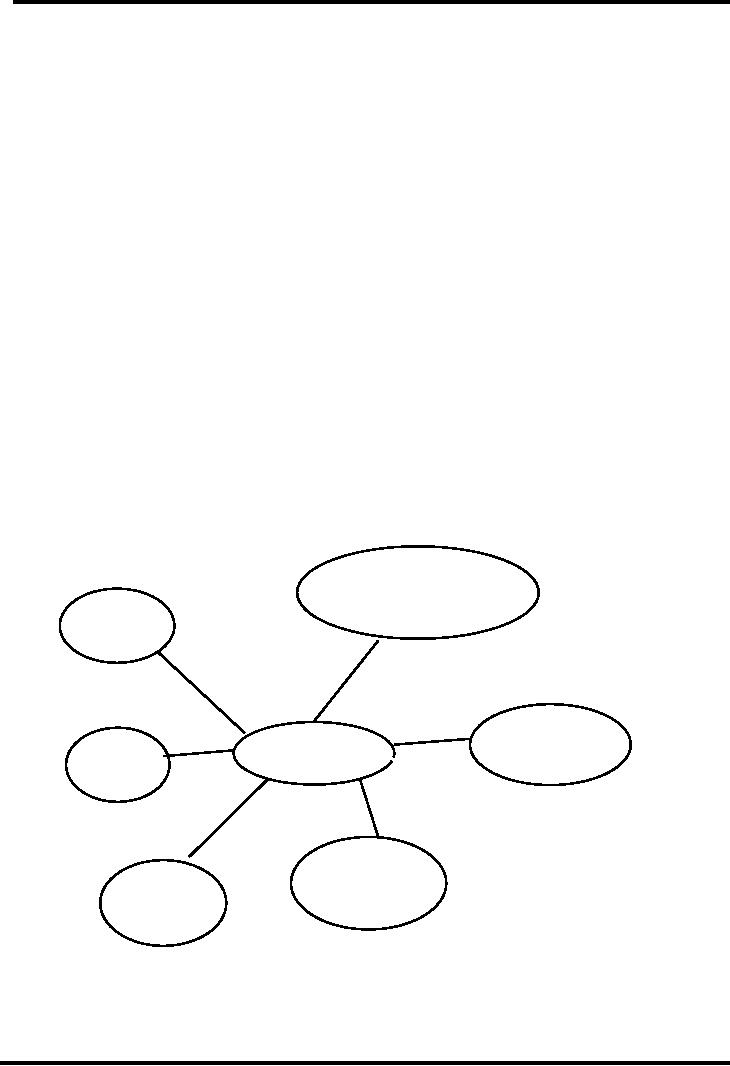 |
THE PROCESS OF WRITING:INVENTION, WHEN YOU START TO WRITE |
| << QUALITIES OF GOOD WRITING:Be concise, Be creative, Be correct |
| THE PROCESS OF WRITING II:ORGANIZING, DRAFTING, REVISING >> |

Journalistic
Writing MCM310
VU
LECTURE
6
THE
PROCESS OF WRITING
The
process includes Invention,
Collection, Organization, Drafting,
Revising, and Proofreading.
INVENTION
"A
writer keeps surprising
himself... he doesn't know what he is
saying until he sees it on the
page."
--
Thomas Williams
When
you sit down to
write...
-
Does your mind turn
blank?
-
Are you sure you
have nothing to say?
If
so, you're not alone! Everyone
experiences this at some time or other,
but some people have
strategies or
techniques
to get them started. When
you are planning to write
something, try some of the
following
suggestions.
EXPLORE
the problem -- not the
topic
1.
Who is your reader?
2.
What is your purpose?
3.
Who are you, the writer? (What
image or persona do you want to
project?)
MAKE
your goals operational
1.
How can you achieve
your purpose?
2.
Can you make a
plan?
GENERATE
some ideas
1.
Brainstorm
-
Keep writing
-
Don't censor or
evaluate
-
Keep returning to the
problem
2.
Talk to your reader
-
What questions would they
ask?
-
What different kinds of readers
might you have?
3.
Ask yourself questions
A.
Journalistic questions
Who?
What? Where? When? Why?
How? So What?
WHEN
YOU START TO
WRITE
You
can try the textbook
formula:
15

Journalistic
Writing MCM310
VU
I.
State your thesis.
II.
Write an outline.
III.
Write the first
draft.
IV.
Revise and polish.
.
. . but that often doesn't
work!
Instead,
you can try one or more of
these strategies:
Ask
yourself what your purpose is
for writing about the
subject.
There
are many "correct" things to
write about for any subject,
but you need to narrow down
your choices. For
example,
your topic might be "hostel
food." At this point, you
and your potential reader
are asking the same
question,
"So what?" Why should you write about
this, and why should anyone
read it?
Do
you want the reader to pity
you because of the intolerable
food you have to eat
there?
Do
you want to analyze large-scale
institutional cooking?
Do
you want to compare University
Hostel 1's food to that
served at Hostel 2?
Ask
yourself how you are going
to achieve this purpose.
How,
for example, would you
achieve your purpose if you
wanted to describe some
movie as the best you've
ever
seen? Would you define
for yourself a specific means of
doing so? Would your
comments on the movie go
beyond
merely telling the reader
that you really liked
it?
Nutshell
your whole idea
Tell
it to someone in three or four
sentences.
Diagram
your major points somehow.
Make
a tree, outline, or whatever
helps you to see a schematic
representation of what you have.
You may
discover
the need for more material
in some places.
COLLECTION
1.
Internal source of
information:
1)
You yourself
1.
free writing, brain storming,
probing yourself
PROBING
YOURSELF
1.
What does X mean?
(Definition)
2.
What are the various
features of X? (Description)
3.
What are the component parts of X?
(Simple Analysis)
4.
How is X made or done?
(Process Analysis)
5.
How should X be made or done?
(Directional Analysis)
6.
What is the essential function of X?
(Functional Analysis)
7.
What are the causes of X?
(Causal Analysis)
8.
What are the consequences of X?
(Causal Analysis)
9.
What are the types of X?
(Classification)
10.
How is X like or unlike Y?
(Comparison)
11.
What is the present status of X?
(Comparison)
12.
What is the significance of X?
(Interpretation)
16

Journalistic
Writing MCM310
VU
13.
What are the facts about X?
(Reportage)
14.
How did X happen?
(Narration)
15.
What kind of person is X?
(Characterization/Profile)
16.
What is my personal response to X?
(Reflection)
17.
What is my memory of X?
(Reminiscence)
18.
What is the value of X?
(Evaluation)
19.
What are the essential major
points or features of X?
(Summary)
20.
What case can be made
for or against X?
(Persuasion)
21.
(Adapted from Jacqueline
Berke's Twenty
Questions for the Writer
)
LISTING:
For
example:
HOLIDAYS
is your topic and you
list out the points to
consider.
1.
Good and bad
holidays
2.
School holidays
3.
Family holidays
4.
Holidays abroad
5.
Plans and
preparations
6.
Special memories
CLUSTRING:
Holidays
abroad
Bad
holidays
Plans
&
Good
Holidays
preparations
holidays
Special
Public
memories
holidays
Source:
Purdue University Sources.
17
Table of Contents:
- INTRODUCTION TO JOURNALISTIC WRITING:Practical, THINGS TO KNOW
- QUALITIES OF GOOD WRITERS
- QUALITIES OF GOOD WRITERS
- QUALITIES OF GOOD WRITING:Achieve appropriate readability:
- QUALITIES OF GOOD WRITING:Be concise, Be creative, Be correct
- THE PROCESS OF WRITING:INVENTION, WHEN YOU START TO WRITE
- THE PROCESS OF WRITING II:ORGANIZING, DRAFTING, REVISING
- ALL ABOUT WORDS:HOW WORDS ARE FORMED?:SUFFIXES
- DICTIONARY-A WRITER’S LANGUAGE TOOL:KINDS OF INFORMATION
- PARTS OF SPEECH:Noun Gender, Noun Plurals, Countable Nouns
- BASIC CLAUSE PATTERNS
- ACTIVE AND PASSSIVE VOICE
- MODIFIERS AND SENTENCE TYPES:COMPOUND SENTENCES
- REPORTED SPEECH:Indirect Questions, Direct commands
- GRAMMATICAL SENTENCE – ISSUES:SUBJECT-VERB AGREEMENT
- GRAMMATICAL SENTENCE – ISSUES II:SENTENCE FRAGMENTS
- EFFECTIVE SENTENCE:PARALLELISM, NEEDED WORDS, SHIFTS
- STYLE: GUIDELINE AND PITFALLS I:COLLOQUIAL VS FORMAL, CIRCUMLOCUTION
- STYLE: GUIDELINE AND PITFALLS II:AMBIGUITY, REDUNDANCY, EUPHEMISM:
- PARAGRAPH WRITING: TYPES AND TECHNIQUES:STRUCTURE
- PARAGRAPH WRITING: TYPES AND TECHNIQUES:Putting on Our Play
- ESSAY WRITING:VARIOUS STRATEGIES FOR ESSAYS, PROMPTS
- SIGNAL WORDS:Non word Emphasis Signals
- EXPOSITORY WRITING:LOGICAL FALLACIES, APPEAL TO EMOTION
- THE WRITING STYLES: REPORT and NARRATIVE WRITING, SHORT REPORTS
- THE WRITING STYLES: DESCRIPTIVE AND PERSUASIVE WRITINGS, Observation
- RESEARCH WRITING AND DOCUMNETING SOURCES:Handling Long Quotations
- Summary and Précis Writing:CHARACTERISTICS OF GOOD SUMMARY
- Punctuation:THE PERIOD, THE COMMA, THE SEMICOLON, THE COLON
- MECHANICS:ABBREVIATIONS, NUMBERS, SPELLING, THE HYPHEN
- READING SKILLS FOR WRITERS:EDUCATED READING, STEPS
- PARTS OF A NEWSPAPER:Box-out, By-line, Caption, Exclusive, Feature
- THE LANGUAGE OF THE NEWSPAPERS II:BROADSHEET NEWSPAPER
- News Writing and Style I:WHAT TO LOOK FOR IN A NEWSPAPER
- NEWS WRITING II:Accuracy, Clarity, Style, Qualities of Effective Leads
- EDITORIAL WRITING:WRITING AN EDITORIAL:STRUCTURING AN EDITORIAL
- WRITING FEATURES:GENERATING FEATURE STORY IDEAS
- WRITING COLUMNS:Column and a news report, Purpose, Audience
- WRITING ARTICLES FOR NEWSPAPERS:The Heading, The Lead
- WRITING ANALYSIS:purpose, scope, method, results, recommendations
- LETTERS TO EDITORS:Four important aspects about letters, Organizing letters
- BROADCAST AND WEB NEWS WRITING:WRITE CONCISELY, BROADCAST STYLE
- WRITING PRESS RELEASE, REVIEWS AND OBITUARIES:Summary of Content:
- THE ART OF INTERVIEWINGS
- FINAL THOUGHTS:Practical, Job-Related, Social, Stimulating, Therapeutic